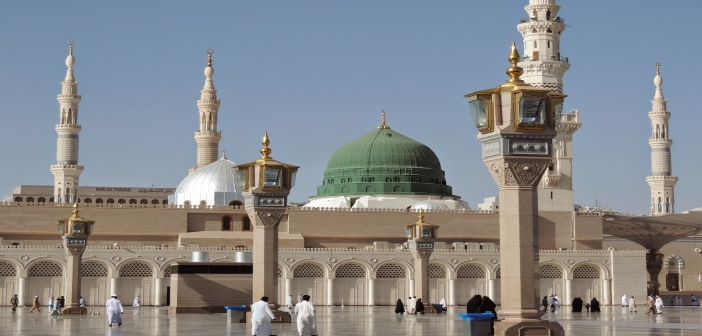How was his diligence in following the divine commands?
Divine orders vary in types and levels. Just as there are some that are related to the external and internal sides of a human being, there are others that are related to his relation with himself, with Allah, and with other people. Our Prophet (pbuh) dutifully performed all levels of Divine orders and lived his life on the straight path. Despite their difficulty, he performed all steps of the straight path, or Shari’ah, tariqah, haqiqah, and ma’rifah, as the role model for those who would like to walk on that path. Although, he was meticulous in matters related to his personal life, his attentiveness was much stronger in matters of social life. In this respect, it is possible to find many examples in his life.
His meticulousness can be observed especially in cases of punishments of crimes concerning human rights. Considering the Divine order in the verse, “…And let not pity for the twain withhold you from obedience to Allah, if you believe in Allah and the Last Day…” (al-Nur 24; 2) our Prophet (pbuh) said that:
“Apply the punishments of Allah to those who are closely related to you and to those who are not related. No criticism of the critics should hold you from performing the order of Allah.” (Ibn Majah, Ḥudud, 3)
“Giving one of the punishments of Allah is better for a town than to get rain for forty nights.” (Ibn Majah, Ḥudud, 3)
In a matter ordered by Allah the Almighty, the Messenger of Allah (pbuh) was never dilatory or acted contrary to His orders. Following is an important incident in this regard.
The Quraish were concerned about a woman from the tribe of Makhzum, who had committed theft during the lifetime of Allah’s Apostle (pbuh). They said:
“Who would speak to Allah’s Messenger (pbuh) about her?” They (again) said:
“Who can dare do this but Usama b Zaid, the loved one of Allah’s Messenger (pbuh)?” She was brought to Allah’s Messenger (pbuh) and Usama b. Zaid spoke about her to him (interceded on her behalf). The color of the face of Allah’s Messenger (pbuh) changed, and he said:
“Do you intercede in one of the prescribed punishments of Allah?” He (Usama) said:
“Messenger of Allah, seek forgiveness for me.” Allah’s Messenger (pbuh) stood up and gave an address.
“He (first) glorified Allah as He deserves, and then said: Now to our topic. This (injustice) destroyed those before you that when any one of (high) rank committed theft among them, they spared him, and when any weak one among them committed theft, they inflicted the prescribed punishment upon him. By Him in Whose Hand is my life, even if Fatima daughter of Muhammad were to commit theft, I would have cut off her hand.” (Bukhari, Anbiya, 54; Muslim, Ḥudud, 8, 9)
Allah the Glorious prohibited the killing of an innocent person and regarded it such a great sin as killing the entire humanity. (al-Maidah 5; 32) The Messenger of Allah (pbuh) was very meticulous and sensitive in this matter. Below is another good example that shows this.
“It is narrated on the authority of Miqdad b. Aswad that he said:
“Messenger of Allah, you just see (here is a point): If I encountered a person amongst the infidels (in the battlefield) and he attacked me and struck me and cut off one of my hands with the sword. Then he (in order to protect himself from me) took shelter of a tree and said: I become Muslim for Allah’s sake. Messenger of Allah, can I kill him after he had uttered this?”
The Messenger of Allah (pbuh) said:
“Do not kill him.” I (the narrator) said:
“Messenger of Allah, he cut off my hand and uttered this after amputating it; should I then kill him?” The Messenger of Allah (pbuh) said:
“Don’t kill him, for If you kill him, verily he would be in a position where you had been before killing him and verily you would be in a position where he had been before uttering (kalima).” (Bukhari, Maghazi, 12; Muslim, Iman, 155)
A similar incident is reported by Uthama b. Zaid about himself.
“The Messenger of Allah pbuh) sent us to the people of Huraqat, a tribe of Juhaina. We attacked the tribe early in the morning and defeated them. A man from the Ansar and I caught hold of a person (of the defeated tribe). When we overcame him, he said:
“There is no god but Allah.”
At that moment the Ansari spared him, but I attacked him with my spear and killed him. The news had already reached the Apostle (pbuh), so when we came back he (the Apostle) said to me:
“Usama, did you kill him after he had made the profession: There is no god but Allah?”
I said:
“Messenger of Allah, he did it only as a shelter.”
The Holy Prophet observed:
“Did you kill him after he had made the profession that there is no god but Allah?” He (the Holy Prophet) went on repeating this to me till I wished I had not embraced Islam before that day.” (Bukhari, Diyat, 2; Muslim, Iman, 158-159)
“O you who believe when you go abroad in the cause of Allah, investigate carefully, and say not to anyone who offers you a salutation: you are none of a Believer coveting the perishable goods of this life…” (al-Nisa 4; 94) (Wahidi, p. 175-177)
In this way, our beloved Prophet (pbuh) shows us through his exemplary deeds how we should act in matters about which there is a clear command from Allah the Almighty.
Source: An Excellent Exemplar, Osman Nuri Topbaş, Erkam Publications





